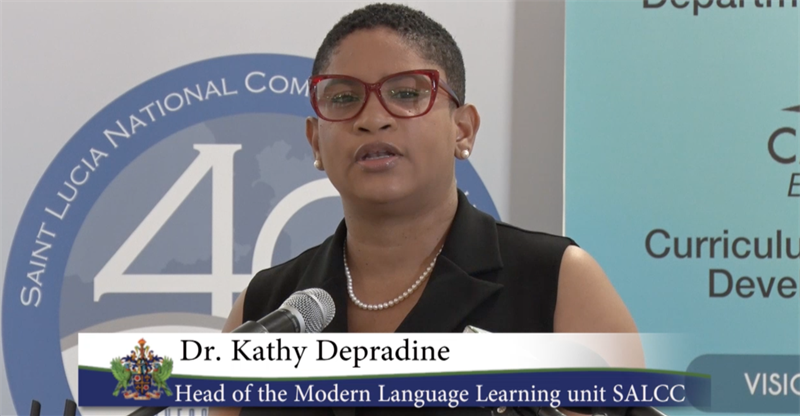THE TEACHING OF KWÉYÒL TO BE FULLY ADOPTED IN SCHOOLS.
 Education officials are working toward having students be bilingual at the end of primary school and biliterate at the end of secondary school, ensuring that they are as capable of reading and writing in Kwéyòl, as they are in English.
Education officials are working toward having students be bilingual at the end of primary school and biliterate at the end of secondary school, ensuring that they are as capable of reading and writing in Kwéyòl, as they are in English.
Stakeholders gathered for a presentation of the National Language Policy and Implementation Plan, which seeks to fully integrate the Saint Lucian patois into the school curriculum.
The Curriculum and Materials Development Unit (CAMDU) of the Department of Education, Innovation, and Vocational Training secured funding from education partner UNESCO—the United Nations Educational, Scientific and Cultural Organization—to design an implementation plan for the application of the Saint Lucia National Language Policy.
Secretary General for the Saint Lucia National Commission for UNESCO, Ms. Marcia Symphorien, said the organization is committed to promoting languages and multilingualism in the education system, because languages advance inclusion, foster social cohesion, and contribute to Sustainable Development Goal (SDG) #4 – leaving no one behind.
“Today’s consultation forms part of a broader process which seeks to take the National Language Policy from policy stage to implementation phase,” Ms. Symphorien said. “The project was conceptualized by the language department of CAMDU in the Ministry of Education and was funded by UNESCO under its participation programme 2020/2021 call. Specifically, the project addresses the very important issue of the status of the creole language within the education system. The key objective is the development of an implementation plan that will transform policy into action.”
The policy was developed under the OECS USAID Early Learners Programme in order to address the language needs of students in the early grades. The draft implementation plan was presented to stakeholders by a suite of language specialists and educators, focusing on four pillars: teacher professional development, curriculum and assessment, resource acquisition, and development and research.
“My purpose is to speak on the implications that the implementation of this language education policy will have on the nation’s teachers,” said SALCC Head of the Modern Language Learning Unit, Dr. Kathy Depradine. “Overall our goal is to ensure that our learners who are the most important clients in this process benefit from their tenure within the school system. Of course, teachers are very critical to learners achieving these learning objectives in the classroom.”
Following the presentation, participants provided feedback on the National Language Policy as it nears the final stages of implementation. Working sessions to develop the plan are set to continue with stakeholders.
The draft policy can be viewed and downloaded from the CAMDU website. The official presentation of the National Language Policy and Implementation Plan is earmarked for July 2022.